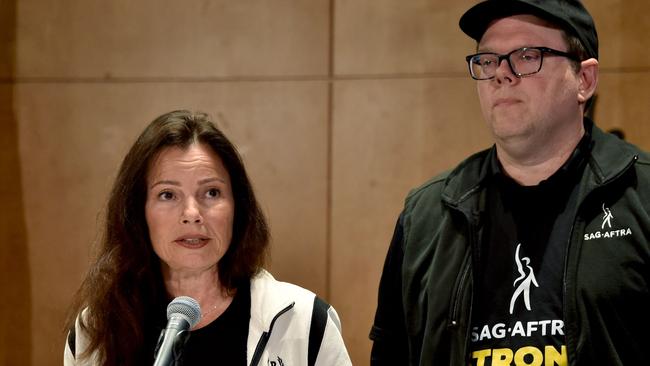Hollywood actors set to join writers on strike after contract expires
A prolonged strike involving writers and actors could mean Hollywood’s pipeline of fresh shows and movies will thin.
Hollywood actors will go on strike starting Friday after their union failed to reach a new labour contract with studios, joining already-striking writers in a standoff likely to grind the entertainment industry to a halt.
A prolonged strike involving writers and actors could mean that broadcast and cable networks won’t have fresh scripted TV episodes ready for the early fall, and that Hollywood’s pipeline of fresh shows and movies will thin.
Streamers such as Netflix and Max tend to produce programming far in advance of planned release dates, as do movie studios, so they may not feel the effect of a labour stoppage until late 2024 at the earliest.
The talks between the Screen Actors Guild – American Federation of Television and Radio Artists and the Alliance of Motion Picture and Television Producers, a coalition representing movie and TV studios, networks and streamers, ended Wednesday night as the deadline to reach a new three-year deal expired.
SAG-AFTRA said in a statement released early Thursday morning that its negotiation committee voted unanimously to recommend to its national board to call a strike, which could start as early as Thursday. It is unclear when or how talks with the AMPTP might resume.
Issues that have led writers and actors to this point include compensation, royalties and the use of artificial intelligence during the creative process.
“The companies have refused to meaningfully engage on some topics and on others completely stonewalled us. Until they do negotiate in good faith, we cannot begin to reach a deal,” said SAG-AFTRA President Fran Drescher.

In a recent statement to members, SAG, which represents about 140,000 actors as well as stunt performers and voice-over artists, said residual payments aren’t keeping up with the revenue media companies are generating from scripted content around the globe.
Generative artificial intelligence is another sticking point, with writers and actors seeking strict guidelines and protections over the use of the technology. There is concern that generative AI could be used to supplant writers. Performers fear unauthorised use of their likeness without their consent or compensation.
The AMPTP responded Thursday morning that SAG-AFTRA walked away from an offer of “historic pay and residual increases” as well as increased pension caps and protections from the use of artificial intelligence. “Rather than continuing to negotiate, SAG-AFTRA has put us on a course that will deepen the financial hardship for thousands who depend on the industry for their livelihoods,” the AMPTP said.
A SAG strike against the purveyors of content is its first in nearly four decades and the first time since 1960 that both writers and performers have been on the picket line at the same time. The Writers Guild of America put their pens down on May 2.
For the major entertainment giants, a dual strike comes at an already challenging time. Several major streaming services including Walt Disney’s Disney+ and Paramount Global’s Paramount+ are unprofitable, and a weak advertising market and cord-cutting are inflicting pain on the traditional television businesses that had buoyed them.
“The strikes will create even more chaos,” said MoffettNathanson media analyst Michael Nathanson, adding that the industry is “seeing declines in linear profitability and no signs of true sustainable profitability in streaming.” Since the writers walked out, much of the industry has been on a forced hiatus. Episodes for new and returning television shows aren’t being written and late-night shows such as ABC’s ” Jimmy Kimmel Live!” are dark.
Performers were continuing to work on movies and television shows with completed scripts, although striking writers often targeted active productions and managed to even temporarily shut several down.
With performers on strike as well, work is only likely to continue on content that is in the final stages of post production, in which actors and writers aren’t typically required.
Earlier this week, the Fox network announced its fall schedule would be mostly composed of unscripted fare and animated shows that had already finished production before the strikes.
A SAG strike also means performers will likely be prohibited from promoting their shows and movies which includes appearances on TV and radio as well as at fan events such as next week’s Comic-Con event in San Diego.
Hollywood’s other major union – the Directors Guild of America – agreed to a new deal last month that provided for a 21% increase in royalties from streaming services, a significant portion of which will come from international operations.
The AMPTP put language in its agreement with the DGA about artificial intelligence that said, “ensures that DGA member’s job duties will not be replaced by or assigned to, GAI,” the DGA said.
Dow Jones



To join the conversation, please log in. Don't have an account? Register
Join the conversation, you are commenting as Logout